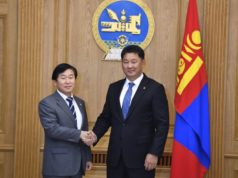The Japan-funded foundation for the so-called „comfort women“ during the Second World War is to be dissolved. This was announced by the Seoul Ministry of Family Affairs in a statement.
A protest came from Japan immediately: „The relationship between countries can only exist if international promises are kept,“ said Premier Shinzo Abe on the announcement from South Korea. Japanese Foreign Minister Takeo Akiba cited the South Korean Ambassador to himself.
The Foundation was part of a controversial agreement between Japan’s Prime Minister Shinzo Abe and South Korea’s former President Park Geun Hye in 2015.
Tokyo agreed to pay around 7.8 million euros, which flowed into a fund from which the Victims of sexual enslavement by the Japanese military during the Second World War should be compensated.
The agreement is controversial because, in return, South Korea pledged not to make any further claims or blame for Japan on the mass forced prostitution of thousands of women. The agreement between Japan and South Korea was described by both governments as „definitive and irreversible“ when the foundation was established.
Protesters outside the Japanese embassy in Seoul demand official compensation for the „comfort women“
The current Seoul government of President Moon Jae In has repeatedly questioned the treaty, however, as it would not adequately acknowledge the fates of those affected. South Korea once again demanded that Japan officially apologize to former prostitutes on the first official day of remembrance for „comfort women“ on August 14 this year. It was about restoring „the dignity and honor of the victims,“ said the head of state.
Denial of the „dark past“
According to historians, an estimated 200,000 girls and women forced the Japanese military to sex in front brothels in Korea, China, Thailand, Myanmar, the Philippines, Indonesia, and Taiwan between 1937 and 1945. Not only has South Korea been calling for an official apology from the Japanese government for decades, but also human rights organizations such as the Society for Threatened Peoples (GfbV) criticize the „gloomy past“ being denied and not worked up.
The historical dispute has burdened the relations of both countries for decades. It is expected that the one-sided dissolution of the Foundation will reignite the diplomatic dispute. Of the promised equivalent of around € 7.8 million, almost half were paid out to 34 victims and another 58 surviving families. According to the Seoul Ministry of Foreign Affairs, they will work with the Japanese government to discuss how the dissolution of the foundation should be financially regulated.



